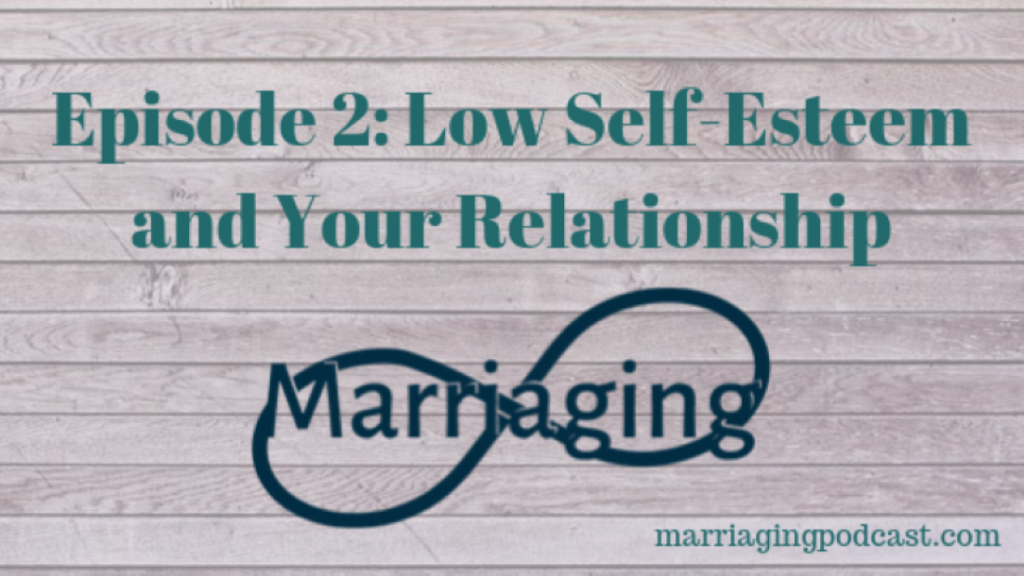Low Self-Esteem and Your Relationship
Low self-esteem can take quite a toll on your relationship. In this episode, we’re digging deeper into understanding what low self-esteem is, the signs you can look for, and how your low self-esteem affects your relationship. We’re also talking about what you can do, individually and with your partner, to combat low self-esteem and strengthen your marriage.
Main Points of this Episode:
What does low self-esteem look like?:
- You might be really hard on yourself, or really sensitive to constructive criticism. You may find yourself getting caught up in downward spiral of negative self-talk.
- You might feel pretty irritable, or catch yourself being snappy or short with loved ones. Your spouse might also feel the tension in this and start getting frustrated with you.
- You could be isolating yourself more, withdrawing from activities with your spouse, friends, or family. This is not the same as being introverted or appreciating some quiet time. This is problematic in that you might be worried about others’ opinions, or have a negative perspective that keeps you from enjoying this time with others.
- You may also be lacking motivation. Maybe you’re caring less about how well you do with work or other tasks. You might even feel worthless at times, not valuing your skills or abilities.
How does low self-esteem affect your marriage?
- Your spouse might be struggling to connect with you. If you’re shut down, or feeling like a shell of the person you’ve been or want to be, it may be difficult for them to understand or truly support you. More distance and disconnection may develop between you and your spouse as a result.
- Your relationship could experience more conflict. If you’re more irritable or on edge, which can happen with low self-esteem, you’re likely to snap at your partner. They may get frustrated with this, or they may feel hurt by harsh comments. They might argue back or engage in conflict with you.
- You both could lose more connection with each other if low self-esteem is leading you to isolate. You might pull away from your partner, and they may feel lonely. It becomes harder for them to support you. They might go spend time with friends without you, or they may begin to isolate themselves as well.
- If you’re losing motivation with low self-esteem, you might also be less intentional with your marriage. Maybe you’re putting less effort into helping to keep things running smoothly at home. Or you’re possibly caving to mindless distractions, like being on your phone, instead of engaging in meaningful conversations with your spouse.
- Low self-esteem can also affect the physical intimacy of your relationship, and your sex life. This could be in part a result of your negative self-talk and insecurity, or a result of more conflict in your relationship, or the other issues that come with low self-esteem. But it likely means that you and your partner might have less sex, or less enjoyable sex. You might not have the sex drive you used to or would like to.
What you can do to take action and work through the low self-esteem in your relationship:
- First, reflect on how you experience low self-esteem. What are your signs of low self-esteem? What might your partner be noticing about you? You can even write this down.
- Next, plan a time with your partner to talk about this. Set aside distractions and give your full attention to this discussion. Share your insights with them. Tell them what signs you experience with low self-esteem. If there’s anything else that you think might be related to this, like sudden changes in your life situation, or issues with family, mention these things too. Then, ask what they’ve noticed. Talk with each other about how you’ve both noticed this impacting your marriage.
- Then, begin recognizing the negative self-talk. Even write those thoughts down if you want to. And scratch them out and replace them with the truth. Dispute the negative self-talk.
- After you’ve worked through the negative self-talk some (and this is certainly an ongoing process), then share this with your spouse and seek their support. This is not about making your spouse responsible for your thoughts, your self-talk, your feelings, or your healing process. But this is about building understanding and empathy in your marriage.
- Work with your spouse to identify the areas of your relationship, or other areas of your social life, that are affected by your low self-esteem. Brainstorm new activities you can try together. Create a schedule that works. Work together, once you know what is happening to your relationship, to put into action ways to combat the low self-esteem.
- When it comes to any frustration or irritability in your marriage, try to recognize if there is anything that triggers you to be irritable, anything that pushes your buttons. Then, recognize how it might make you feel (like frustrated, or hurt, or worried). When that happens, what do you do? Do you get snappy with your partner or get a harsh tone? Ask them to do this same exercise, answering these same questions. What pushes their buttons? How do they feel, and then what do they do? Talk through this with each other, and try to recognize any patterns. I imagine that there are things each of you do that push each other’s buttons. This isn’t about blaming the other person. This is about recognizing what you do when you feel a certain way, and accepting responsibility for that action and beginning to change it. If you know you tend to snap at your spouse when you’re feeling negative, then you can become aware of when you feel that way, take a deep breath, and agree to walk away and come back to discuss the issue when you can do so calmly.
- Remember: low self-esteem is challenging and hard to break free from. It can be helpful to do individual therapy, but it can also be helpful for you and your spouse to do couples therapy for low self-esteem.

